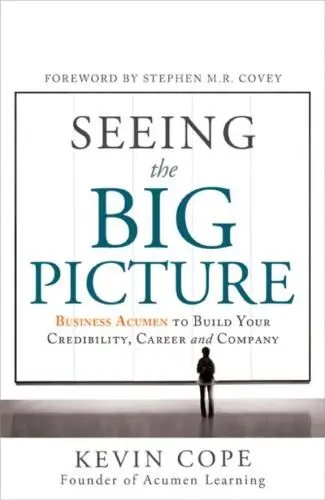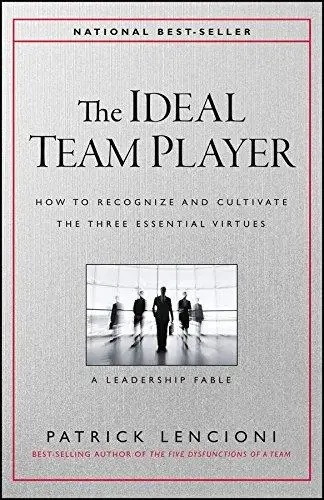The Ideal Team Player
How to Recognize and Cultivate The Three Essential Virtues
What's it about?
The Ideal Team Player is a compelling guide that unveils the three indispensable virtues of a team player: humility, hunger, and smarts. Through a captivating fable, Lencioni explores how cultivating these qualities can transform an individual into an invaluable team member, fostering a thriving, cohesive work environment. This book is essential for anyone aiming to excel in teamwork, offering practical insights for building stronger, more unified teams.
About the Author
Patrick M. Lencioni is a master of unmasking the subtleties of organizational health through captivating fables. Best known for "The Five Dysfunctions of a Team," his work uniquely weaves together storytelling with practical business insights, offering readers a powerful lens to examine leadership and teamwork. Lencioni's compelling narratives are a beacon for those striving to create cohesive and effective teams.
10 Key Ideas of The Ideal Team Player
Cultivate Humility in Team Interactions
Humility is foundational for team players.
It involves putting the team's objectives above personal glory, acknowledging others' contributions, and being open to feedback.
Humble team members facilitate a culture of trust and respect, essential for collaboration and innovation.
They recognize their limitations and seek help when needed, fostering an environment where learning and growth are prioritized.
Learn DeeperPractice Active Listening: During team meetings or one-on-one conversations, focus on truly understanding what others are saying before responding. This means not interrupting, asking clarifying questions, and summarizing their points to ensure you've got it right.
Acknowledge Others' Contributions: Make it a habit to publicly recognize the efforts and achievements of your teammates. This can be as simple as thanking someone for their help on a project during a team meeting or sending an appreciative email copied to the team.
Seek Feedback Regularly: Don't wait for formal reviews to find out how you can improve. Ask your peers and managers for feedback on your performance, especially after completing tasks or projects. Be open to what they say and use it as a basis for growth.
Admit Mistakes and Learn from Them: When you make a mistake, own up to it immediately. Share what went wrong and what you've learned from the experience with your team. This not only shows humility but also encourages a learning culture within the team.
- Example
Imagine you're working on a group project and you realize that a mistake you made has led to a delay. Instead of trying to hide it, you bring it up in the next team meeting, explain how it happened, apologize, and outline your plan to rectify the situation. This demonstrates humility and responsibility.
- Example
During a project debrief, instead of focusing solely on your contributions, you make a point to highlight the efforts of each team member, detailing how their work was crucial to the project's success. This fosters a sense of appreciation and unity within the team.
Embrace and Encourage Hunger for Success
A hungry team player consistently seeks improvement and takes initiative beyond their specific role responsibilities.
This hunger drives the team forward, ensuring that projects don't stall and that the team continuously seeks opportunities for growth.
Hungry team members motivate others by example, showing dedication and a strong work ethic.
Their drive for success pushes the team to achieve collective goals efficiently.
Learn DeeperSet Personal and Professional Goals: Start by setting clear, achievable goals for yourself both in your personal life and at work. This helps to direct your hunger for success in a focused manner.
Seek Feedback and Act on It: Regularly ask for feedback from peers and supervisors. Use this feedback to identify areas for improvement and take action to enhance your skills and knowledge.
Take Initiative: Don't wait for opportunities to come to you. Look for ways to contribute beyond your current role. Volunteer for new projects, suggest improvements, and be proactive in solving problems.
Invest in Continuous Learning: Dedicate time each week to learn something new related to your field. This could be through online courses, reading, or attending workshops. Staying updated and acquiring new skills fuels your hunger for success.
Celebrate Small Wins: Recognize and celebrate your achievements and those of your team. This not only motivates you but also encourages a culture of acknowledgment and appreciation within the team.
- Example
A marketing professional who notices the company's social media engagement is lacking takes the initiative to research and propose a new social media strategy, demonstrating their hunger for improving the company's performance.
- Example
An IT specialist who, upon completing their regular tasks, offers to help colleagues with their projects or learns a new programming language in their free time to bring more value to the team.
Develop and Demonstrate Smart Social Skills
Being 'smart' in a team context refers to having good interpersonal skills and emotional intelligence.
Smart team players understand the dynamics within the team, communicate effectively, and manage relationships with empathy.
They can read the room, adapt their communication style as needed, and resolve conflicts constructively.
This ability ensures smooth collaboration and maintains a positive team atmosphere.
Learn DeeperPractice Active Listening: Make a conscious effort to listen more than you speak in conversations. This involves maintaining eye contact, nodding, and providing feedback that shows you understand what the other person is saying. It's not just about waiting for your turn to speak but truly understanding the perspective of others.
Develop Your Emotional Intelligence (EQ): Work on recognizing your own emotions and those of others. This can be done through self-reflection, mindfulness exercises, or even reading books on emotional intelligence. Understanding emotions helps in managing reactions and interactions more effectively.
Learn to Adapt Your Communication Style: Observe how different team members prefer to communicate and try to adapt your style accordingly. For example, some may prefer direct and concise emails, while others might value a quick chat. Adapting your style can lead to more effective communication.
Engage in Conflict Resolution: Don't shy away from conflicts; instead, see them as opportunities for growth. Approach conflicts with a problem-solving mindset, focusing on the issue at hand rather than personal attacks. Practice empathy and strive to understand the other person's viewpoint while also expressing your own clearly.
- Example
During a team meeting, Sarah notices that John seems upset about the discussion on project timelines. Instead of ignoring his discomfort, she asks for his input and listens attentively, acknowledging his concerns. Later, she adapts her communication to a more direct style, as preferred by John, to discuss potential solutions.
- Example
Alex is part of a project team with diverse communication preferences. He makes an effort to send concise emails to Emma, who prefers them, and sets aside time for in-person updates with Tom, who values face-to-face interaction. This approach helps Alex to maintain smooth communication within the team.
Foster Open and Honest Communication
Open and honest communication builds trust among team members.
It involves transparently sharing thoughts, feedback, and concerns without fear of retribution.
This practice encourages a culture where issues are addressed promptly, and innovative ideas are freely exchanged.
Effective communication prevents misunderstandings and builds a foundation for strong teamwork and problem-solving.
Learn DeeperPractice Active Listening: When a team member is speaking, give them your full attention. Nod, make eye contact, and ask clarifying questions to show you are engaged and value their input. This encourages more open sharing of ideas and concerns.
Create a Safe Space for Sharing: At the beginning of team meetings, remind everyone that all thoughts and feedback are welcome. Establish a rule against negative reactions to someone's input. This can help in fostering an environment where people feel safe to express themselves honestly without fear of judgment or retribution.
Encourage Regular Check-ins: Schedule regular one-on-one or team check-ins where the sole purpose is to share feedback, concerns, and ideas. This ensures that communication is ongoing and not just limited to project updates or crisis moments.
Lead by Example: Be transparent with your own thoughts, feedback, and concerns. When team members see leaders practicing open and honest communication, they are more likely to follow suit.
- Example
During a team meeting, a project manager notices that a team member seems hesitant to share their opinion on the proposed strategy. The manager pauses the discussion to directly ask for the team member's input, emphasizing that all perspectives are valuable and necessary for the team's success.
- Example
A team leader sets up a monthly 'open forum' meeting where team members can bring up any ideas, concerns, or feedback they have. To ensure it's a safe space, the leader starts by sharing their own feedback on the project and areas they think could be improved, encouraging others to do the same.
Commit to Collective Decisions and Plans
Once a team decision is made, every member should commit to it, even if they initially disagreed.
This commitment is crucial for unity and momentum.
It demonstrates respect for the team process and trust in collective wisdom.
By supporting team decisions in action and spirit, members contribute to a focused and cohesive effort towards shared goals.
Learn DeeperVoice Your Opinion During Discussions: Before a decision is made, ensure you actively participate in the discussion. Share your insights, concerns, and suggestions. This ensures that you've contributed to the process, making it easier to commit to the final decision, even if it wasn't your preferred outcome.
Practice Active Support: Once a decision is made, visibly support it. This could mean speaking positively about it in meetings, offering your skills to help implement it, or defending the decision if it's questioned by others outside the team.
Reflect on the Bigger Picture: Remind yourself of the team's overall goals and how the decision, even if not your favorite, contributes to these objectives. This perspective can help shift your focus from personal preference to collective success.
Seek to Understand, Then to Be Understood: If you initially disagreed with the decision, take time to understand the reasons behind the collective choice. This understanding can foster acceptance and commitment on your part.
- Example
Imagine your team decides to adopt a new project management tool that you're not fond of. To commit to this collective decision, you could start by learning the tool's features and how it could potentially improve workflow. Then, share any useful tips you discover with your team, demonstrating your support for the decision.
- Example
Your team votes to change the meeting structure to a format you believe is less efficient. Instead of holding onto your reservations, you decide to actively participate in the new format, offering constructive feedback and suggestions after giving it a fair chance. Your engagement shows commitment to the team's decision and helps refine the process for everyone.
Deeper knowledge. Personal growth. Unlocked.
Unlock this book's key ideas and 15M+ more. Learn with quick, impactful summaries.
Read Full SummarySign up and read for free!
The Ideal Team Player Summary: Common Questions
Experience Personalized Book Summaries, Today!
Discover a new way to gain knowledge, and save time.
Sign up for our 7-day trial now.
No Credit Card Needed

Similar Books

The Decision Book: 50 Models for Strategic Thinking
Mikael Krogerus
Emotional Intelligence at Work
Dalip Singh
Seeing the Big Picture
Kevin Cope
Leadership Is Concept Heavy
Dr. Enoch Antwi
Great by Choice
Jim Collins
The Leader′s Guide to Coaching in Schools
John Campbell
Preparing School Leaders for the 21st Century
Stephan Gerhard Huber
The E-Myth Manager
Michael E. Gerber
Leadership Is Language
L. David Marquet
Start-up Nation
Dan SenorTrending Summaries

Peak
Anders Ericsson
Never Split the Difference
Chris Voss
Smart Brevity
Jim VandeHei
The Psychology of Money
Morgan Housel
The First 90 Days
Michael D. Watkins
Atomic Habits
James Clear
Thinking, Fast and Slow
Daniel Kahneman
The Body Keeps the Score
Bessel van der Kolk M.D.
The Power of Regret
Daniel H. Pink
The Compound Effect
Darren HardyNew Books

The White Night of St. Petersburg
Michel (Prince of Greece)
Demystifying Climate Models
Andrew Gettelman
The Hobbit
J.R.R. Tolkien
The Decision Book
Mikael Krogerus
The Decision Book: 50 Models for Strategic Thinking
Mikael Krogerus
Fichte
Johann Gottlieb Fichte
Do No Harm
Henry Marsh
This is Going to Hurt
Adam Kay
This Is Your Brain on Joy
Earl Henslin

